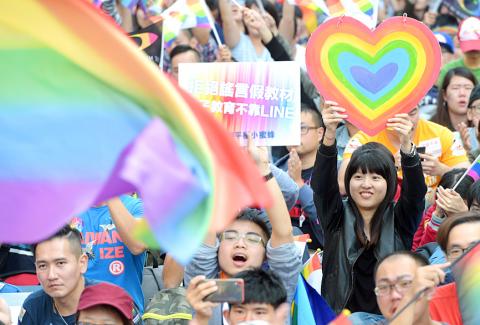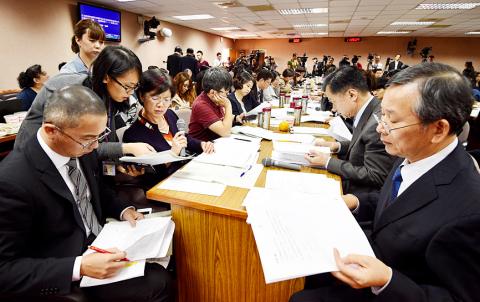Amid heated protests, amendments to the Civil Code to recognize same-sex marriage cleared a legislative committee yesterday, bringing the nation one step closer to legalizing same-sex marriage.
The legislature’s Judiciary and Organic Laws and Statutes Committee passed draft amendments to the Civil Code which would legalize same-sex marriage and entitle same-sex couples to the same marital, parental and adoptive rights and obligations accorded to heterosexual couples by the Civil Code and other laws, with the exception of the presumption of paternity, a legal determination that is still exclusively for heterosexual couples.
During the review, the committee revised an amendment proposed by Democratic Progressive Party (DPP) Legislator Yu Mei-nu (尤美女) that would neutralize the gender-based Article 972 of the Civil Code, which stipulates that a marriage is an agreement between a man and a woman.

Photo: Chang Chia-ming, Taipei Times
Yu’s amendment would remove the “man and woman” provision from the article and recognize marriage as an agreement between “two parties,” a contentious point between supporters and opponents of the marriage equality legislation.
However, to reduce opposition to the legislation, DPP Legislator Julian Kuo (郭正亮) raised a motion to revise Yu’s amendment, proposing that “man and woman” be retained, but inserting an addendum to recognize “both parties of a same-sex marriage.”
Chinese Nationalist Party (KMT) Legislator Hsu Shu-hua (許淑華) raised a similar motion.

Photo: Peter Lo, Taipei Times
Kuo’s motion was passed.
An amendment to the adoption regulations of the Civil Code would introduce an anti-discrimination provision to prohibit the courts from rejecting adoption applications based on gender, gender identification or sexual orientation.
The amendments, as well as other draft bills on marriage equality, are to be deliberated in cross-caucus negotiations before further reviews. The next legislative review is not expected until April.
“It is an act of democracy that the amendments were passed after communication and deliberations,” Yu said.
She called on the public not to spread misinformation about the amendments, as, unlike opponents of the legislation have said, the amendments would not remove the legal terms “father” and “mother” or “husband” and “wife.”
“The public can rest assured that the legislation will not change heterosexual marriage in any way, but it will extend [the rights and obligations of] such marriages to same-sex couples,” she said. “The legislation will not destroy the family or abolish marriage.”
The legalization of same-sex marriage does not cause civic unrest in the Netherlands, which was the first country to legalize same-sex marriage, Yu said, urging marriage equality opponents to exercise tolerance.
She rejected proposals to launch a referendum to decide on marriage equality, saying a human rights issue should not be put to the vote.
“We are not God. How do we have the right to decide on other people’s human rights?” Yu asked.
It would take at least six months for the legislation to pass, she said, calling on lesbian, gay, bisexual and transgender rights campaigners to make use of those “golden six months” to communicate with the public.
Minister of Justice Chiu Tai-san (邱太三) said the Ministry of Justice would propose a special same-sex marriage law by February, which is expected to undergo review in the next legislative session along with the amendments to the Civil Code passed yesterday.
The committee had asked the ministry to propose legal solutions on the issue of marriage equality, and the ministry could finalize a draft bill by February, Chiu said.

CHAOS: Iranians took to the streets playing celebratory music after reports of Khamenei’s death on Saturday, while mourners also gathered in Tehran yesterday Iranian Supreme Leader Ayatollah Ali Khamenei was killed in a major attack on Iran launched by Israel and the US, throwing the future of the Islamic republic into doubt and raising the risk of regional instability. Iranian state television and the state-run IRNA news agency announced the 86-year-old’s death early yesterday. US President Donald Trump said it gave Iranians their “greatest chance” to “take back” their country. The announcements came after a joint US and Israeli aerial bombardment that targeted Iranian military and governmental sites. Trump said the “heavy and pinpoint bombing” would continue through the week or as long

TRUST: The KMT said it respected the US’ timing and considerations, and hoped it would continue to honor its commitments to helping Taiwan bolster its defenses and deterrence US President Donald Trump is delaying a multibillion-dollar arms sale to Taiwan to ensure his visit to Beijing is successful, a New York Times report said. The weapons sales package has stalled in the US Department of State, the report said, citing US officials it did not identify. The White House has told agencies not to push forward ahead of Trump’s meeting with Chinese President Xi Jinping (習近平), it said. The two last month held a phone call to discuss trade and geopolitical flashpoints ahead of the summit. Xi raised the Taiwan issue and urged the US to handle arms sales to

State-run CPC Corp, Taiwan (CPC, 台灣中油) yesterday said that it had confirmed on Saturday night with its liquefied natural gas (LNG) and crude oil suppliers that shipments are proceeding as scheduled and that domestic supplies remain unaffected. The CPC yesterday announced the gasoline and diesel prices will rise by NT$0.2 and NT$0.4 per liter, respectively, starting Monday, citing Middle East tensions and blizzards in the eastern United States. CPC also iterated it has been reducing the proportion of crude oil imports from the Middle East and diversifying its supply sources in the past few years in response to geopolitical risks, expanding

Pro-democracy media tycoon Jimmy Lai’s (黎智英) fraud conviction and prison sentence were yesterday overturned by a Hong Kong court, in a surprise legal decision that comes soon after Lai was jailed for 20 years on a separate national security charge. Judges Jeremy Poon (潘兆初), Anthea Pang (彭寶琴) and Derek Pang (彭偉昌) said in the judgement that they allowed the appeal from Lai, and another defendant in the case, to proceed, as a lower court judge had “erred.” “The Court of Appeal gave them leave to appeal against their conviction, allowed their appeals, quashed the convictions and set aside the sentences,” the judges